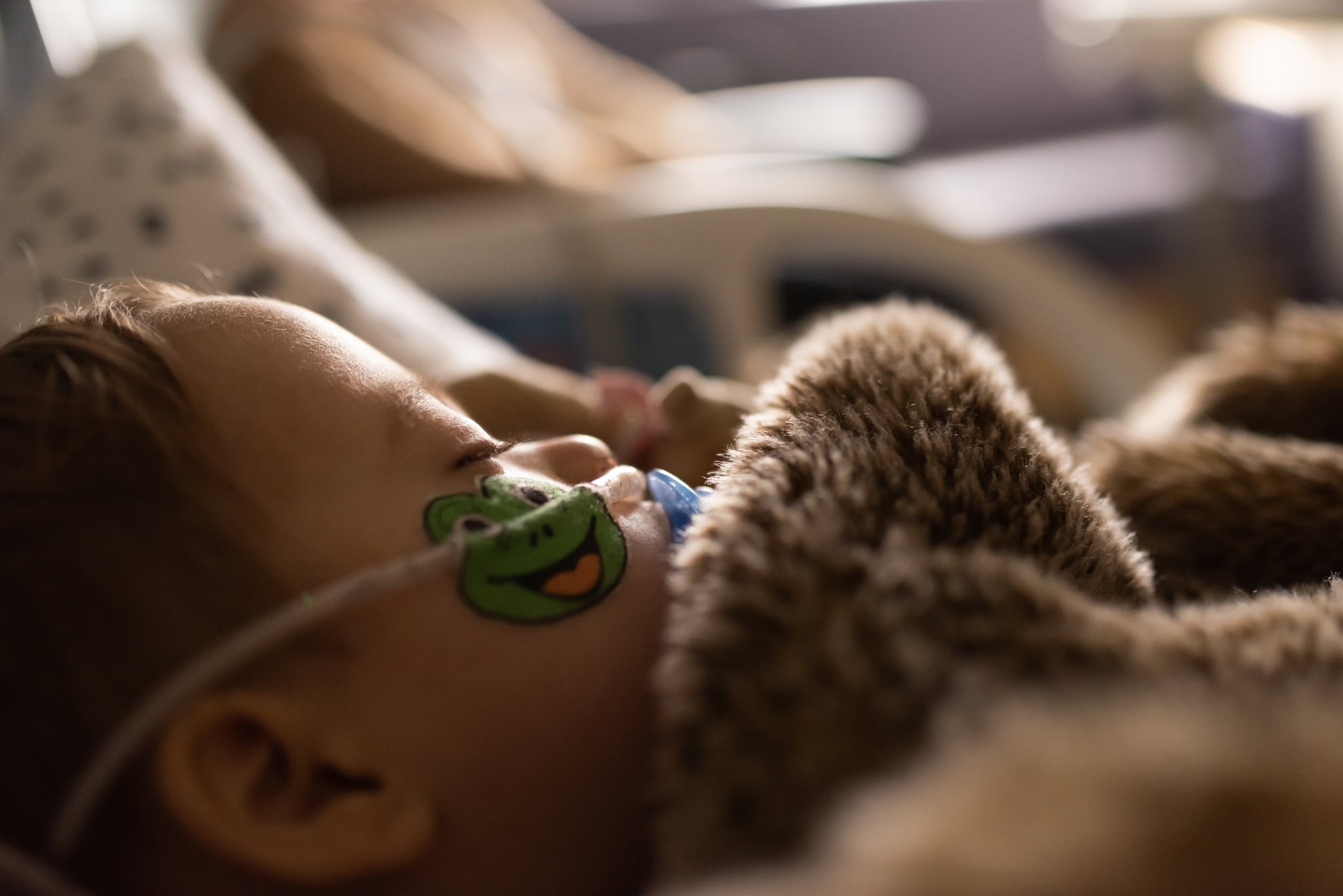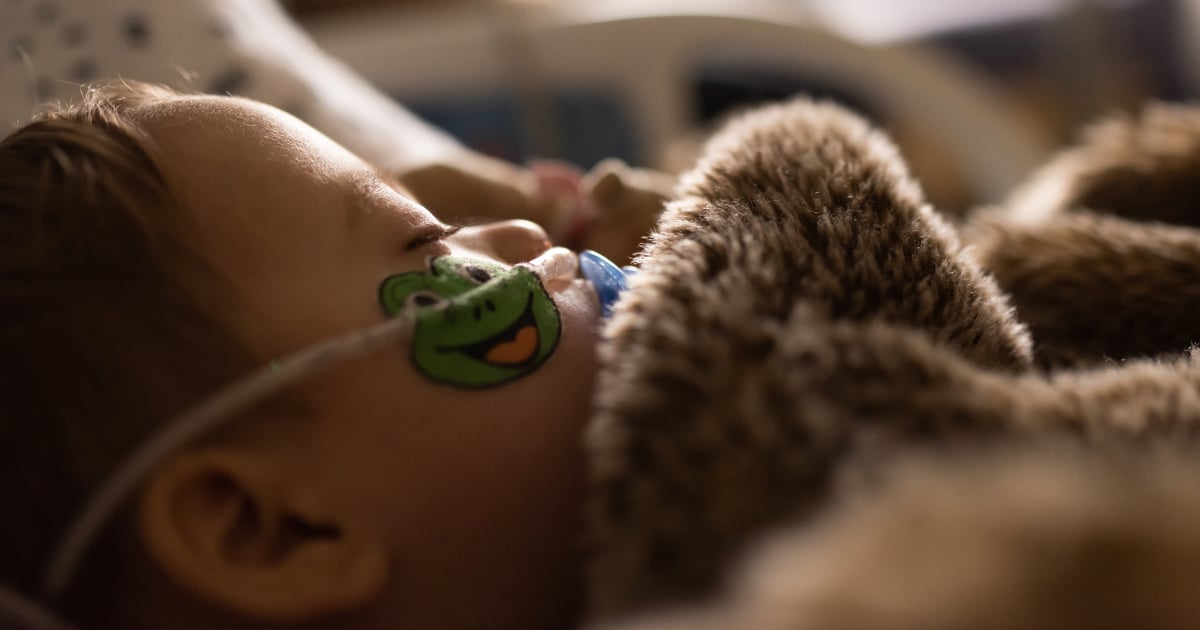
A spike in the respiratory infection commonly known as RSV has left pediatric units across the country overwhelmed. In fact, nationally, 76 percent of pediatric beds are occupied, according to NBC News.
As we get ready to enter the colder months, experts worry that we may have a “tri-demic” or “tripledemic” on our hands, created by simultaneous surges of COVID, the flu, and respiratory syncytial virus or RSV.
The unprecedented spike in RSV, in particular, has taken many by surprise. “We suspect that many children are being exposed to some respiratory viruses now for the first time, having avoided these viruses during the height of the pandemic,” Dr. José Romero, director of the CDC’s National Center for Immunization and Respiratory Diseases, said during a recent press briefing.
Doctors also suspect that the lifting of COVID precautions may have contributed to the surge in infections, per The New York Times. “It all has a very Covid-esque feel to it,” Meghan Bernier, MD, the medical director of the pediatric intensive care unit at Johns Hopkins Children’s Center in Baltimore, told The New York Times. “This is the pediatrician’s Covid. This is our March 2020.”
According to recent news, Pfizer is already working on a new vaccine to give to pregnant people to help prevent RSV. The pharmaceutical company is aiming to submit an application to the Food and Drug Administration (FDA) for approval by the end of 2022.
Still, with the illness currently surging, knowing what to look out for can save a life. Keep reading to learn more about how to prevent RSV and how to treat it.
What Is RSV?
Respiratory syncytial virus (RSV) is a common respiratory virus that can cause mild, cold-like symptoms. The recovery time is typically a week or two and most infants will get it before the age of 2, per the CDC. But certain children are more likely to develop severe symptoms. In typically healthy adults, for example, RSV might look like a nasty cold, but for premature infants it can be a serious threat.
In high-risk babies — such as babies born prematurely, children under 2 born with heart or lung disease, infants with weakened immune systems, and children 8-10 weeks old — RSV can become a much more serious infection. Symptoms of RSV can include wheezing or difficulty breathing, decreased or no appetite, decreased fluid intake, sneezing and coughing, runny nose, and fever, according to the CDC. Severe cases of RSV can cause bronchiolitis or pneumonia, and require oxygen and intubation.
What are RSV Symptoms?
Those infected with RSV usually show symptoms of a mild, cold-like illness within 4 to 6 days after becoming infected. But the type of symptoms to look out for can vary depending on age. Below are the common symptoms of RSV broken down by age, according to the Cleveland Clinic.
RSV Symptoms in Adults and Children Over 5
- Runny nose
- Decrease in appetite
- Coughing
- Sneezing
- Fever
- Wheezing
Some adults and children over 5 may not experience any symptoms of RSV or the symptoms will be very mild. However, if your child is having trouble breathing, the Cleveland Clinic advises that you head to the emergency room. And if you’re experiencing RSV symptoms, particularly if you’re over 65, have a compromised immune system, or have a heart or lung condition, call your healthcare provider.
RSV Symptoms in Toddlers
Toddlers, or children ages 1 to 3, will experience similar symptoms as adults: runny nose, coughing, coughing, sneezing, and decreased appetite. They may also be less interested in playing, have trouble swallowing and breathe faster than they normally do.
RSV Symptoms in Babies
For very young infants (those under 6 months old), it can be tricky to spot the signs of RSV because the symptoms tend to be more mild, including:
- Irritability
- Decreased activity or appetite
- Difficulty breathing
If your baby or toddler is exhibiting these severe RSV symptoms below, the Cleveland Clinic advises you visit the emergency room or call 911:
- Noisy breathing
- Flaring of nostrils with every breath.
- Blue or gray color lips, mouth and fingernails.
- Belly breathing or “caving in” of the chest in the form of an upside-down “V” starting under the neck.
- Short, shallow, slow or rapid breathing.
- Pauses while breathing.
How Is RSV Prevented?
Like with the common cold or COVID-19, washing your hands is an essential preventative measure, according to the Mayo Clinic. Avoiding exposure, keeping things clean by disinfecting surfaces, refraining from sharing glasses, and washing toys regularly are also listed as best practices. The Mayo Clinic also encourages parents not to smoke, as “babies who are exposed to tobacco smoke have a higher risk of getting RSV and potentially more-severe symptoms.” If you do smoke, it’s advised that you do it away from your baby — never in the house or car.
There’s also a protective medication available, called palivizumab (Synagis). It’s given in the form of a shot and designed for children under 2 who are at high risk of serious complications from RSV. Pfizer is also working on a new vaccine to protect against RSV. The single dose would be given to pregnant people in their late second or third trimester and protect newborns from the virus throughout their first six months of life. In the first 90 days of the baby’s life, Pfizer’s vaccine was 81 percent effective at preventing severe lower respiratory tract illnesses that require hospitalization or assisted breathing, according to the company’s data. Pfizer plans to submit the candidate to the FDA for approval by the end of 2022.
Until we have such preventative measures, it’s important to be very attentive to signs and symptoms of RSV. If an infant has symptoms of a cold that aren’t improving, take them to the doctor immediately.
How Is RSV Treated?
Most RSV infections go away on their own in less than two weeks, the CDC says. There’s no current treatment plan to fight the infection, but for adults, you can relieve symptoms by drinking fluids to prevent dehydration and taking over-the-counter fever reducers and pain relievers. For children, talk to your child’s healthcare provider first before giving them nonprescription cold medicines, and never give aspirin to children. In more severe cases when there is difficulty breathing, go to the hospital immediately. Oxygen or intubation may be necessary.
— Additional reporting by Alexis Jones
